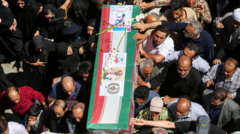Rafael Grossi, the head of the IAEA, has expressed concerns that Iran could begin enriching uranium again shortly after military strikes by the US and Israel. Despite conflicting reports from Iran's leadership regarding the damage sustained, the IAEA's assessment suggests that the country's nuclear capabilities remain intact, posing significant risks for future diplomacy.
UN Chief Warns Iran's Nuclear Progress Could Resume Soon

UN Chief Warns Iran's Nuclear Progress Could Resume Soon
The head of the UN's nuclear watchdog indicates Iran could restart uranium enrichment for a possible bomb within months, amidst ongoing tensions and military actions involving the US and Israel.
The head of the International Atomic Energy Agency (IAEA), Rafael Grossi, has warned that Iran could resume enriching uranium to potentially develop a nuclear weapon "in a matter of months." This unsettling revelation follows recent military strikes by the United States and Israel targeting Iranian nuclear facilities, where significant but not total damage was reported.
Grossi contradicted former President Donald Trump's assertion that Iranian nuclear sites had been "totally obliterated", emphasizing that crucial infrastructure remains intact. Speaking to CBS News, Grossi noted that Iran still has the industrial capability to enrich uranium, stating, "if they so wish, they will be able to start doing this again," referring to the centrifuges necessary for this process.
The military actions on June 13 by Israel, followed by US involvement, were justified by claims that Iran was nearing the capability to produce a nuclear bomb. However, a Pentagon assessment indicated that the effectiveness of the strikes only slightly delayed Iran's nuclear ambitions. In response to criticisms, Trump maintained that the strikes were a major military success, despite the IAEA's findings.
Currently, Iran and Israel have agreed to a ceasefire, yet tensions remain high. Trump has publicly stated that he would not rule out further military action if intelligence suggests that Iran is close to enriching uranium again. Iran's Supreme Leader Ayatollah Ali Khamenei dismissed the strikes as inconsequential, while Foreign Minister Abbas Araghchi acknowledged significant damage.
The relationship between Iran and the IAEA has further deteriorated, especially after Iran's parliament voted to limit cooperation with the agency, accusing it of aligning with Western interests. Following a UN finding that Iran had violated its non-proliferation commitments—its first breach in two decades—concerns regarding Tehran's nuclear intentions have escalated.
Despite these challenges, Grossi expressed a desire to negotiate with Iran to find a long-lasting diplomatic resolution. Since the US withdrew from the 2015 nuclear deal, Iran has gradually escalated its uranium enrichment activities, which now reportedly include enough 60%-enriched uranium to potentially produce several nuclear bombs. As the region grapples with volatility, the international community remains on high alert over Iran's nuclear capabilities.





















